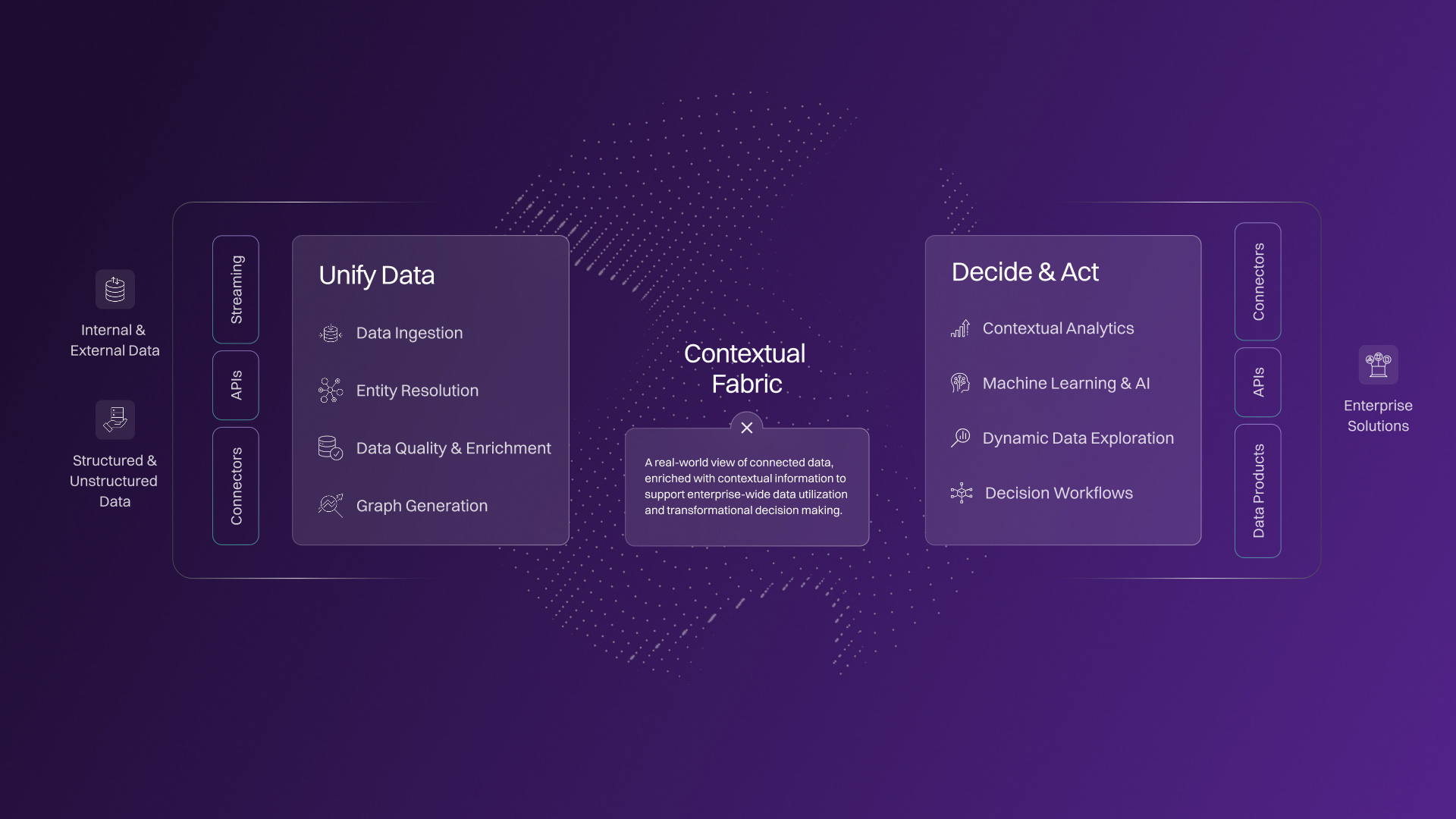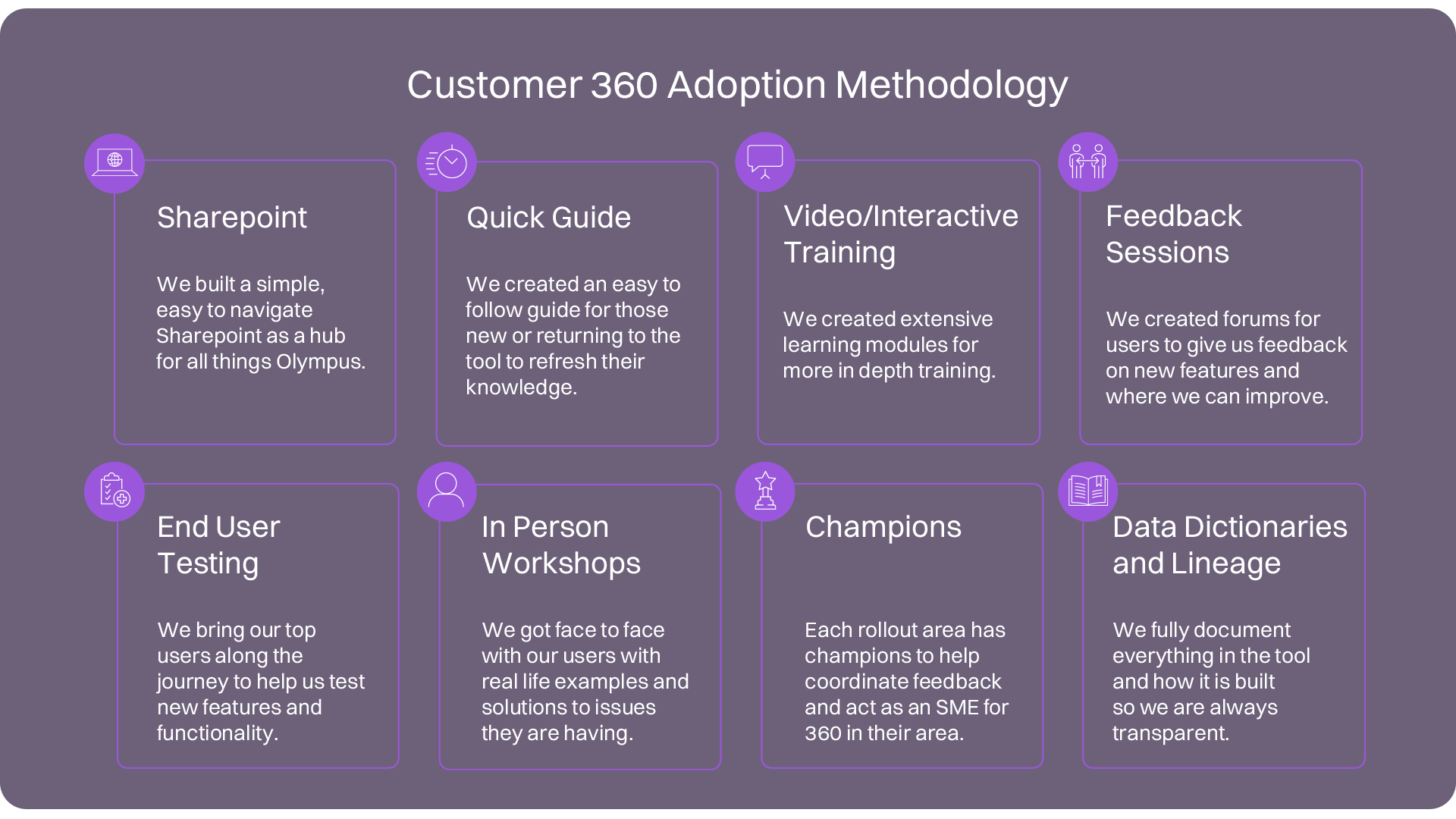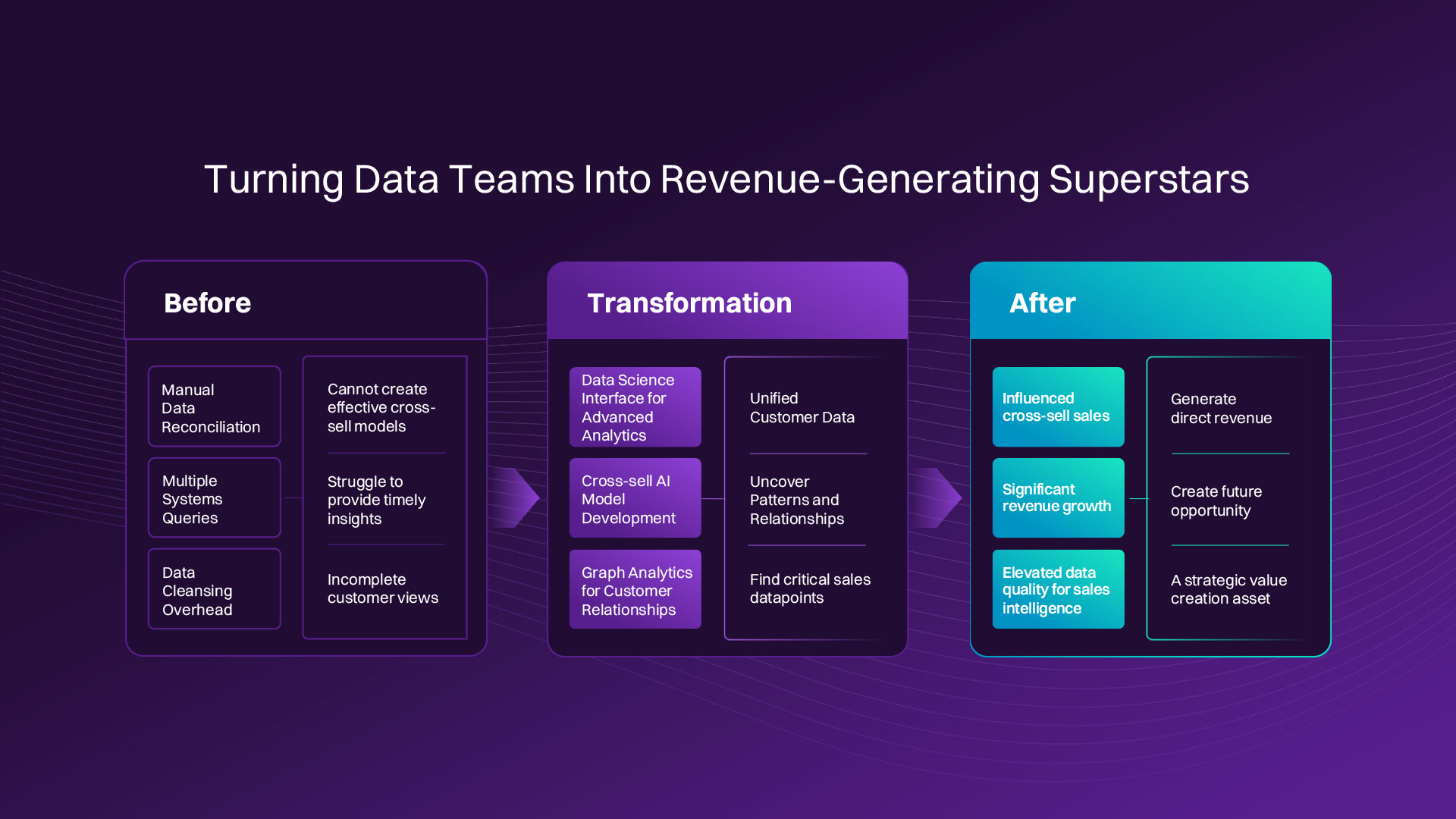As a trailblazer in the telco industry—where digital-native competitors and rising customer expectations set a high bar—Vodafone continually seeks new ways to deliver exceptional value. Embracing the opportunity to modernize its data landscape, Vodafone transformed decades of accumulated information into a powerful asset for innovation and customer service.
Over three decades of mergers and acquisitions, Vodafone Business’s built a rich and diverse data landscape, but it became increasingly complex and harder to manage.
Several industry experts have discussed the challenges and opportunities telcos face with the significant amount of M&A activity. McKinsey reports that in 2024, companies “invested $698 billion in just over 1,460 TMT (technology, media, and telecommunications) deals.” The report suggests this trend will continue in 2025, spurred by “increased cost pressures, the emergence of new technologies, and a dramatic change in the regulatory environment for deals.”
KPMG echoed McKinsey’s findings in a recent article that said, “the integration of AI and advanced technologies is reshaping the landscape, creating new opportunities and challenges.”
Given the speed at which this sector is growing, Vodafone is hardly alone. The wave of M&As that has swept through the telco industry has left many providers grappling with the same issues: sprawling IT ecosystems, duplicated data, and no clear path to achieve a single customer view. Recognizing the immense potential within this complexity, Vodafone set out to unlock new value by connecting data, empowering teams, and enhancing operational agility at scale.
Led by Miryem Salah, Director of Digital Data and Transformation at Vodafone, her team took a new approach to solving the data-complexity challenge—one that not only answered the growing data question but also positioned B2B data and data products as revenue-driving assets, ultimately driving Vodafone beyond a data-driven organization and transforming it into an innovative decision-centric organization.
“When I joined the UK business as the Chief Data Officer, we had the goal to establish a Customer 360 view…. [We] spent a lot of time with our sales, delivery, and care colleagues, and their biggest opportunity was to achieve a unified view of customer interactions and product engagement, enabling more meaningful conversations and efficient service."
“My vision was to help democratize data so that people, specifically from a sales perspective, would be able to have very meaningful conversations [with customers]. I thought if we could democratize the database and teach them to use it, they would be able to do more and be a lot more efficient.”
Miryem took the feedback from her key stakeholders and quickly turned it into a vision to overcome the data problem based on four goals:
Create a single view of the customer across multiple systems
Empower frontline teams with relevant, AI-powered insights
Drive faster, smarter sales and service decisions
Turn data teams into growth catalysts
Executing against these goals would not only require some changes to Vodafone’s tech stack, but a cultural shift as well. Internal teams would need to adopt new technologies and transform the way they looked at themselves and their responsibilities—not just as analysts, but as revenue-generators whose data skills would drive new marketing and sales opportunities.
One of the most important things she requires of herself and those around her is to “embrace technology and make sure we progress and change—because ongoing growth and adaptation are essential.” Miryem Salah is fully committed to this forward-thinking mindset.
To make her vision a reality, Vodafone partnered with Quantexa, a leading provider of Decision Intelligence, to deliver a platform for Vodafone built on trusted data, contextual relationships, and AI enablement.
Rather than a one-off implementation, Vodafone’s transformation has been a multi-phase, strategic evolution powered by Quantexa’s Decision Intelligence Platform. Each phase built on the last to unlock deeper insights, greater efficiency, and measurable business impact.
There were four core phases:
Customer360: This single, contextualized customer view with real-time visibility across products and services provided immediate customer intelligence across the entire team.
Prospect360: Acquisition insights to find and convert high-value leads provided an instant boost for the Pursuit team.
Master Data Management: Providing clean, governed, AI-ready data across the entire enterprise will foster future growth.
Explorer View: Allowing search parameters in a dashboard view, which enables non-technical users to maximize the value of the tool.
The journey began with Customer360, a foundational initiative launched in October 2022 to address one of Vodafone’s most pressing challenges: the opportunity to create a single version of the truth. With multiple systems and fragmented data across products, Vodafone saw the opportunity to unify information and empower teams to make faster, more informed decisions.
Within just nine months, Vodafone delivered Phase 1 of Customer 360, thanks to a strong partnership and focused execution. By October 2023, the platform had expanded to include data from Fixed, Mobile, Experian, Contracts, Value Added Services, and more, enabling sales teams to validate data accuracy and eliminate inaccurate matching concerns.
Unlocking value across the business with Customer360
Customer360 empowered multiple teams across Vodafone with the contextual data it needed to work smarter and faster. Here are examples of how some of these users are making the most of the Quantexa Decision Intelligence Platform:
Sales: Quick access to customer data for renewals and queries to reduce preparation time and speed up interactions.
Customer Care: Searchable by any data point to help resolve issues faster and more accurately.
Service Managers: Provides a unified view of complex, multi-account customers to reduce reliance on fixed and mobile silos.
Data Teams: Cloud-based, scalable access to clean, linked data with high match accuracy and fuzzy matching.
Operations: Created a product that enables accurate cross-referencing between Salesforce and fixed line systems to drive faster decisions.
Building on this success, Vodafone delivered Prospect 360 in October 2023. This capability leveraged the Customer 360 foundation to help the Acquisition Team identify and convert high-value leads. By integrating historical fixed-line data and enriching it with external and supplier data insights, Vodafone empowered its Pursuit Team to target new business opportunities with precision and speed.
In March 2025, Vodafone took a major step forward with the implementation of Master Data Management (MDM). This initiative focused on creating clean, governed, AI-ready data across the enterprise. With two separate instances set to merge, Vodafone introduced a robust governance structure, including defined data ownership roles and quality rules, along with merge/split functionality. This phase aligned closely with Vodafone’s broader data strategy, ensuring that the platform could support future growth and automation.
Most recently, in June 2025, Vodafone launched the Explorer view, a dashboard-based extension of the 360 programs. Designed for non-technical users, Explorer allows teams to run contextual searches, such as identifying all accounts expiring in the next year, making it easier than ever to extract value from the platform. This democratization of data access has further accelerated adoption and impact across the organization.
Together, these milestones represent a strategic journey that has transformed Vodafone’s data landscape into a growth platform, laying the groundwork for intelligent and effective use of AI.
Technology in action
Quantexa’s Decision Intelligence Platform allowed Vodafone to connect its internal and external data sources to enhance data quality and create an essential, trusted data foundation for success. The core capabilities that power the Decision Intelligence Platform are:
Dynamic Entity Resolution: Entity Resolution helped unify multiple systems into a single, accurate view by taking multiple disparate data points from internal and external sources and resolving them into one distinct, unique entity.
Knowledge Graphs: To provide a simplified view of real-world connections and relationships between transactions, customers, and products to connect entities, transactions, and behaviors.
Contextual Fabric: A real-world view of connected data, enriched with contextual information to support enterprise-wide data utilization and transformational decision-making.
Contextual Analytics: Helped Vodafone reduce time-to-insight, enabling faster, more informed decisions across sales and service by enabling tailored user views for sales, service, and desk agents.
AI Enablement: By preparing and cleansing data at scale, the platform laid the foundation for Vodafone’s AI and machine learning initiatives—powering everything from cross-sell models to generative AI bid assistants.

Cultural shift
Adoption wasn’t automatic. As is often the case when new technologies are introduced to any enterprise, getting the entire organization to switch (and trust) new solutions can be challenging. To make adoption easier, Vodafone built a network of champions to help overcome individual objections and answer questions. The team then rewrote the UI based on both internal and external feedback and implemented a use-case-first rollout to drive adoption.
Bringing trusted data to the masses
For the Data Engineering team, the biggest challenge was getting people within Vodafone to adopt the new Platform. The team started by surveying those who had tried the tool but were not using it regularly to create a strategy aligned to their business goals.They began by taking simple steps and asking basic questions:
How do we bring data to what people actually do?
How do they interact with data?
Do we really have a data model?
What technology do people already use?
How can we consolidate that?
How do we get data into the Cloud?
Input from many stakeholders was built into the platform, which helped drive collaboration. He then appointed an award-winning data literacy team in each area to serve as subject matter experts to solicit further feedback, educate Vodafone’s teams, create data champions, and answer questions.

The team built a guidebook for beginners to find their way around the platform. An instructional video and classes were also added so that users would be more comfortable experimenting with this new technology. Once users could see how fast and easy it was to access information that would save time and make their jobs easier, many naysayers became Platform believers.
Vodafone experienced early benefits realization against thorough business cases and is continuing to deliver against these.
 Perhaps even more impressive were the transformational changes on the qualitative side of Vodafone’s operation that will no doubt lead to even greater success in the years ahead.
Perhaps even more impressive were the transformational changes on the qualitative side of Vodafone’s operation that will no doubt lead to even greater success in the years ahead.
The key highlight was how easily and quickly users could access data. Instead of submitting data requests and waiting two weeks for a response, they were shocked to find that the new Platform let them access key customer insights in just two clicks—with no wait at all.
At every touchpoint, users were struck by the depth of the insights they could now access and how having a shared, trusted data foundation was positively impacting their contributions to the company:
Sales teams, now armed with instant context, can close more deals faster
Service agents can now resolve customer issues in real time, reducing callbacks
Data teams can now deliver predictive insights and forecasts, not just reports
By using Quantexa’s Decision Intelligence Platform to gain better access to contextual data, Vodafone was able to streamline processes, enabling employees to work faster and more efficiently.
The accompanying chart shows just a few of the challenges that were overcome and improved upon once Vodafone adopted Quantexa’s Decision Intelligence Platform.
From fragmentation to frontline impact: Vodafone’s decision-centric transformation
Before Decision Intelligence | After Decision Intelligence |
Data needed to be unified and accessible across multiple systems. | IT systems are integrated into a single entity shared across the enterprise. Users can access a single, unified customer view in just two clicks. |
No real-time data access. | Sales teams can now access customer data instantly. |
To find account information, users needed to have one search across multiple systems to find answers. | One contextual search bar where users can simply paste in any data to find the right account |
Service managers needed to have immediate access to all relevant customer information, enabling faster and more personalized support. | All data sources are connected to create a holistic view of the customer. Personas are tailored for service managers, pre-sales, and desk teams. |
A simplified UI was needed to make finding information easier and provide customization. | Teams rebuilt the UI in a month based on user feedback, eliminating speed bumps and enabling customization of the Decision Intelligence Platform. |
Needed a scalable cloud-native platform. | A scalable, cloud-native platform on Google Cloud Platform that ensures multiple datasets and customer records are matched accurately. |
More focus on data ownership. | The organization now has stronger data governance with assigned owners, stewards, and custodians. |
As Miryem explained, the road ahead is full of promise, but there is still a lot of hard work and learning to do. “We normally do a refresh of our data strategy every year because things are changing all the time, and Quantexa is an integral part of how we're going to deliver.
“I would say that we need to take a half-step back to focus on making sure that we sweat the asset and make the most out of what we have in Quantexa and other tools before we push ahead.
“But I see this as an integral part of moving forward—not only from a support-to-employees perspective, but also because MDM can resolve one of the biggest opportunities we see. Our customer base evolves as B2B organizations grow—from small businesses into corporate enterprises and beyond. Implementing MDM could help automate it and provide a single source of truth.
“MDM will support the ever-changing customer landscape. This links to our account teams and gives them the best customer experience with the right intelligence.
"Having this very simple solution [from Quantexa] is important operationally in powering our business, but most importantly, it’s empowering our people to resolve customer queries faster, provide proactive support, and create memorable experiences that set Vodafone apart."
Miryem Salah, Director of Digital Data and Transformation, Vodafone
Quantexa’s Decision Intelligence Platform will be able to support the organization's goals by providing:
Real-time customer re-segmentation
Predictive account transitions
Fully automated, GenAI-enabled bid and proposal workflows
Data-powered sales desk models at scale
What makes Vodafone’s data transformation so compelling is that it is ahead of the curve and spearheading innovation by providing a blueprint for telcos and also companies in other sectors—banking, government, and healthcare—to follow as it begins to see the possibilities of what a trusted data foundation can deliver once all of the disparate pieces are brought together.
Once a contextual data foundation is established and the model is operational, organizations can begin to realize the many new possibilities and enhanced decision-making that a single source of truth can deliver:
Data products as a revenue asset: Moving from fragmented systems to actionable insights and measurable ROI
Operational intelligence at scale: The role of contextual analytics and AI in making every business function smarter, faster, and more customer-focused
Cultural and technical transformation: The power of adoption, UX feedback, and cross-functional change management in unlocking platform success
As Miryem suggests, this is not a one-and-done transformation. Adopting Quantexa’s Decision Intelligence Platform provides a whole new model for growth that can be applied to many enterprises. Viewed in the context of the telco sector, however, Vodafone’s success proves that with the right contextual data foundation, AI doesn’t disrupt telcos—it empowers them.






